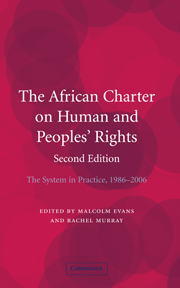Book contents
- Frontmatter
- Contents
- List of contributors
- Table of cases
- List of abbreviations
- Editors' Preface
- Introductory Preface: The African Charter and African Commission on Human and Peoples' Rights
- 1 The African Union and the Regional Human Rights System
- 2 The State Reporting Mechanism of the African Charter
- 3 Communications under the African Charter: Procedure and Admissibility
- 4 Evidence and Fact-Finding by the African Commission
- 5 Civil and Political Rights in the African Charter on Human and Peoples' Rights: Articles 1–7
- 6 Civil and Political Rights in the African Charter: Articles 8–14
- 7 Group Rights
- 8 The Role of Non-governmental Organisations and National Human Rights Institutions at the African Commission
- 9 A View from the Inside: The Role of the Secretariat
- 10 The Special Rapporteurs in the African System
- 11 Working Groups of the African Commission and their Role in the Development of the African Charter on Human and Peoples' Rights
- 12 The Creation of a New African Court of Justice and Human Rights
- 13 Protocol to the African Charter on the Rights of Women in Africa
- Bibliography
- Index
4 - Evidence and Fact-Finding by the African Commission
Published online by Cambridge University Press: 01 July 2009
- Frontmatter
- Contents
- List of contributors
- Table of cases
- List of abbreviations
- Editors' Preface
- Introductory Preface: The African Charter and African Commission on Human and Peoples' Rights
- 1 The African Union and the Regional Human Rights System
- 2 The State Reporting Mechanism of the African Charter
- 3 Communications under the African Charter: Procedure and Admissibility
- 4 Evidence and Fact-Finding by the African Commission
- 5 Civil and Political Rights in the African Charter on Human and Peoples' Rights: Articles 1–7
- 6 Civil and Political Rights in the African Charter: Articles 8–14
- 7 Group Rights
- 8 The Role of Non-governmental Organisations and National Human Rights Institutions at the African Commission
- 9 A View from the Inside: The Role of the Secretariat
- 10 The Special Rapporteurs in the African System
- 11 Working Groups of the African Commission and their Role in the Development of the African Charter on Human and Peoples' Rights
- 12 The Creation of a New African Court of Justice and Human Rights
- 13 Protocol to the African Charter on the Rights of Women in Africa
- Bibliography
- Index
Summary
Introduction
The outcome of communication procedures, namely the findings of violations of particular provisions of the instrument, are well-documented. Yet an analysis of how international human rights bodies examine evidence presented before them has received little attention, usually being considered in passing during examination of the complaints procedures. Indeed, the international and regional bodies themselves, the African Commission being no exception, have often only touched upon such issues. Yet in many of its communications, the African Commission has had to analyse issues of evidence in coming to its decision. This chapter will examine these communications and the general approach of the Commission to issues of evidence and fact-finding in the communication procedure.
While the discussion will draw upon the experience of other international and regional bodies, there are a number of caveats that must be borne in mind when making comparisons. State-only courts such as the International Court of Justice may apply different considerations, and although the African Charter has provision for inter-State communications, it has only produced a decision on one such case. The primary focus of this chapter is on communications that have been submitted by individuals or, often, NGOs. Similarly, the approaches of the international criminal tribunals for Rwanda and Yugoslavia must be treated with caution, given that not only are they conducting criminal procedures, but these are with the aim of determining the guilt of an individual.
Despite limited attention to issues of evidence, a more rigorous approach is needed.
- Type
- Chapter
- Information
- The African Charter on Human and Peoples' RightsThe System in Practice 1986–2006, pp. 139 - 170Publisher: Cambridge University PressPrint publication year: 2008



